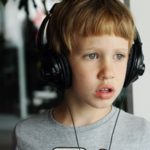 Although it is common for children with sensory processing disorder and those on the autism spectrum to behave in similar ways, not all children who have sensory challenges are “on the spectrum”. It is also possible to be “on the spectrum” and not have a lot of sensory issues.
Although it is common for children with sensory processing disorder and those on the autism spectrum to behave in similar ways, not all children who have sensory challenges are “on the spectrum”. It is also possible to be “on the spectrum” and not have a lot of sensory issues.
Scientists at UCSF have discovered that what distinguishes children on the autism spectrum is that they have brain connectivity deficits in areas related to the processing of facial emotion and memory. What distinguishes children with sensory processing disorder who are not on the spectrum, is that the brain impairments are in the parts that link auditory, visual and tactile sensory processing systems. In my experience it is definitely possible for a child to have both types of impairments and indeed that is quite common.
So what is it like to have a sensory processing disorder?
We all have varying tolerance for auditory, visual and tactile stimulation. I was recently at a conference. As part of the conference there was a dinner with music (loud), karaoke (kind of fun) and shifting, sort of flashing light patterns club style. Strike one for me was that I was trying to have a conversation with someone I just met. Beyond that, by the time I finished eating, listening to a few karaoke numbers and doing one line dance I was feeling overwhelmed and uncomfortable and headed back to my hotel room. I was unable to effectively process the incoming sensory information. As I mature adult (at least I hope so) I made a conscious and appropriate choice for me.
But what about a child who may likely have an even lower “sensory threshold” than I do? Maybe the brightness or the buzzing of overhead lights in the classroom is enough to put him or her over the edge. To further complicate matters many children with sensory processing disorders are “sensory avoiders” in some areas, often bright light and loud noise, and sensory seekers in others- most commonly tactile (they like deep pressure) and vestibular (may enjoy activities like spinning). Temple Grandin, well known in the field of animal husbandry, is autistic. She developed a device to squeeze herself giving her that deep pressure stimulation. There are many compression garments now available for children who would benefit.
Children who are not processing sensory information well have a very hard time learning and therefore generally tend to act out in some way.
So how can I help your child on the autism spectrum and/or with a sensory processing disorder?
Key to my approach with any child is grounded in what my teacher Anat Baniel teaches as one of the hallmarks of her work- “from fixing to connecting”. First I need to meet your child where he or she is, and assume they are doing the best that they can in the current situation. Admittedly if I child is autistic and has lots of challenges connecting this can be difficult. If after making a real effort over a couple of sessions we are unable to connect in a meaningful way, I will make a recommendation regarding options other than working with me.
A second guiding principle I learned from Anat is the importance of the ability to perceive differences and the distinction between stimulation and information. A sensory overloaded child is receiving lots of stimulation according to Anat, but is unable to make sense of it. There is no usable information. They feel overwhelmed and act out.
Using this sign post- helping your child with sensory processing issues is some of the most variable and creative work that I do. Sometimes I use active movement that requires making more clear distinctions. Often I incorporate activities from Brain Gym and Rhythmic Movement. Other times we have primarily verbal interactions. I typically do at least some hands on work in a given session using a clear firm pressure that is most effective with this group in ways to give them a clearer sense of their bodies. This very often helps with achieving a more nuanced sense of the outside world.
If you have or know a child who has a sensory processing disorder and/or autism I would love to speak with you. Please call @ 206-842-4608.




